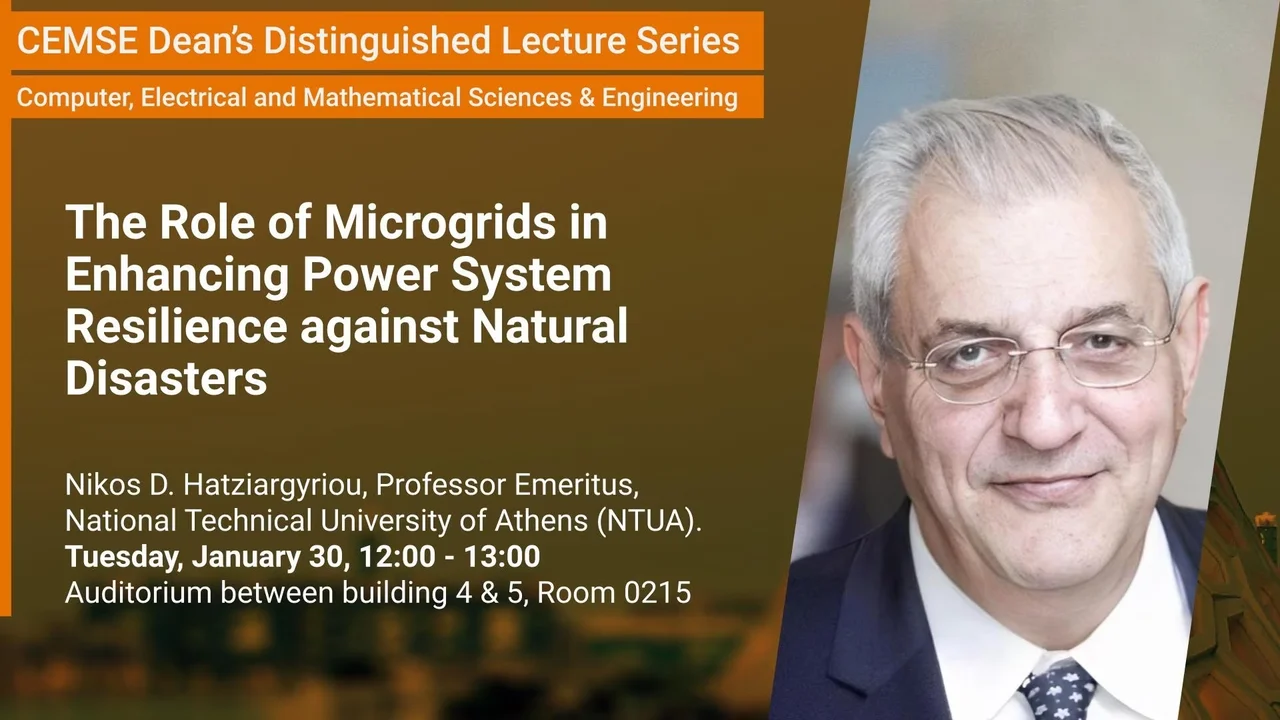
The Role of Microgrids in Enhancing Power System Resilience against Natural Disasters
- Nikos D. Hatziargyriou, Professor Emeritus, National Technical University of Athens (NTUA)
Auditorium between B4 and 5
Power system resilience is defined as the ability of power grids to anticipate, withstand, adapt and recover from high-impact, low-probability (HILP) events. There are long-term and short-term measures that system operators can apply to enhance resilience. Long-term measures include infrastructure hardening and resilient planning, while short-term operational measures are applied in the pre-event, during-event and post-event phases. Microgrids (MGs) can effectively enhance resilience for both transmission and distribution systems due to their ability to operate in a controlled, coordinated way when connected to the primary power grid and in islanded mode. In this presentation, MG-based operational measures for resilience enhancement will be presented, including MG-based resilient operational planning, the systematic formation of MGs after natural disasters hit the system and the role of MGs in power system restoration.
Overview
Abstract
Power system resilience is defined as the ability of power grids to anticipate, withstand, adapt and recover from high-impact, low-probability (HILP) events. There are long-term and short-term measures that system operators can apply to enhance resilience. Long-term measures include infrastructure hardening and resilient planning, while short-term operational measures are applied in the pre-event, during-event and post-event phases. Microgrids (MGs) can effectively enhance resilience for both transmission and distribution systems due to their ability to operate in a controlled, coordinated way when connected to the primary power grid and in islanded mode.
In this presentation, MG-based operational measures for resilience enhancement will be presented, including MG-based resilient operational planning, the systematic formation of MGs after natural disasters hit the system and the role of MGs in power system restoration.
Brief Biography
Nikos D. Hatziargyriou is Professor Emeritus at the National Technical University of Athens (NTUA). He has been an NTUA faculty member of the faculty since 1985 and has been a professor of power systems since 1995. He is also a part-time professor at the University of Vaasa, Finland. He has over 10 years of industrial experience as Chairman and CEO of the Hellenic Distribution Network Operator (HEDNO) and as Executive Vice-Chair and Deputy CEO of the Public Power Corporation (PPC).
Professor Hatziargyriou served as Chair and Vice-Chair of the EU Technology and Innovation Platform on Smart Networks for Energy Transition (ETIP-SNET). He is an honorary member of the International Council on Large Electric Systems (CIGRE) and past Chair of CIGRE SC C6 “Distribution Systems and Distributed Generation.” He is a Life Member of the IEEE, a past Chair of the Power System Dynamic Performance Committee (PSDPC) and a past Editor-in-Chief (EiC) of the IEEE Trans on Power Systems, currently EiC-at-Large for PES Transactions.
Hatziargyriou received the IEEE/PES Prabha S. Kundur Power System Dynamics and Control Award (2017) and the IEEE Herman Halperin Electric Transmission and Distribution Award (2023). He has participated in more than 60 research, development, and demonstration projects funded by the EU Commission and the industry.
In addition to writing the book "Microgrids: Architectures and Control," Hatziargyriou has published more than 300 journal articles and 600 conference proceedings papers. He was included in Thomson Reuters' Top 1% Most Cited Researchers list for 2016, 2017 and 2019 and was the 2020 Globe Energy Prize laureate.
